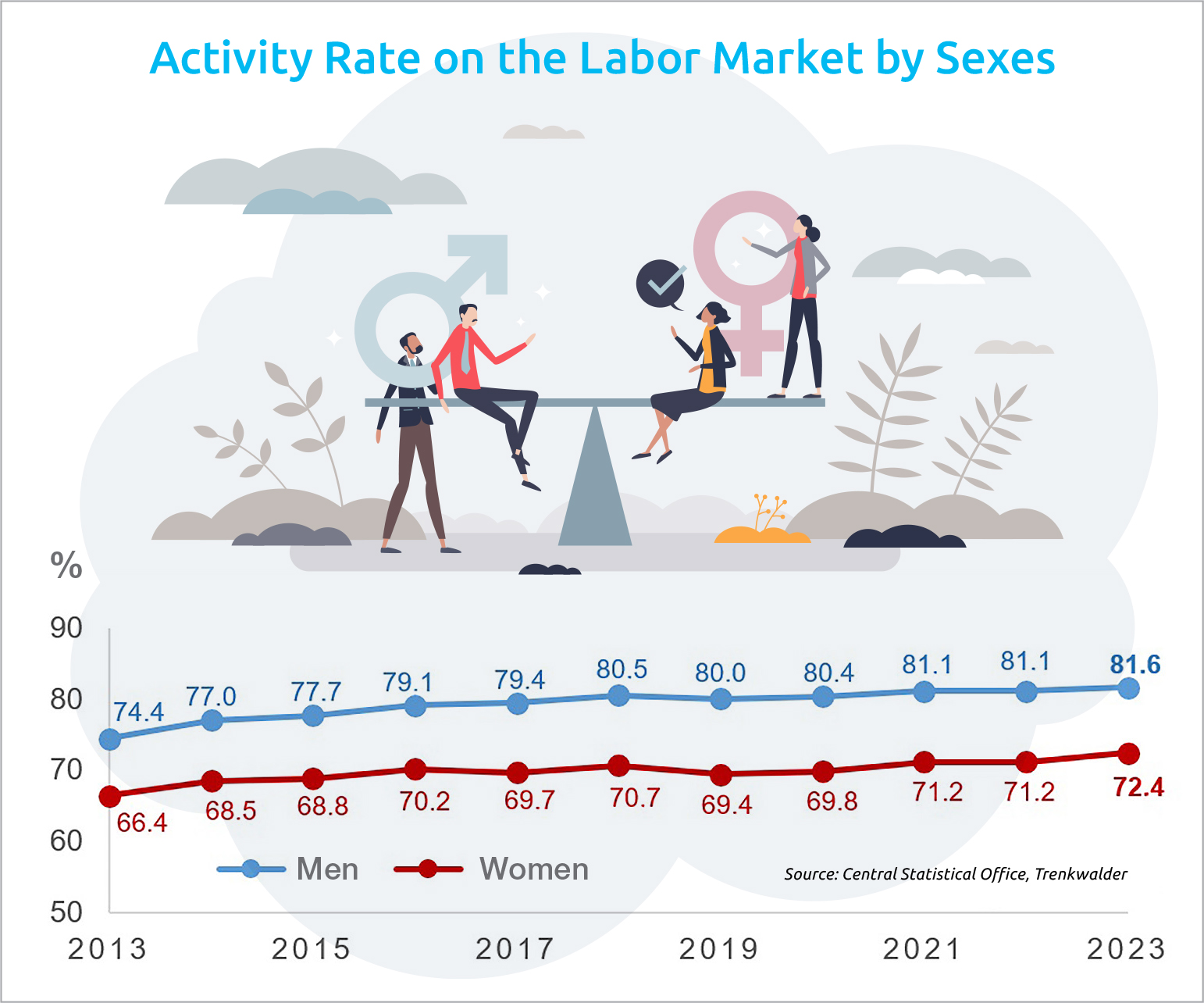Hungarians Unhappy With Salaries, Saving Wherever They Can

As in most HR Matters columns, we start this month with the GKI Economic Sentiment Index, composed of two elements: business confidence and consumer confidence. In the most recent report at the time of writing, released on Feb. 26, GKI notes that Hungary’s industry and construction sectors saw a “noticeable negative change,” although there was a better situation in trade and services.
The good news for job seekers and employees is that the employment intentions of companies did not change significantly compared to the previous month. Consumers, however, were not motivated: after a rise in January, household expectations “deteriorated significantly” last month. Respondents saw the economic outlook for the country over the next 12 months as much less positive compared to January, GKI says.
This is reflected in a survey conducted in early February by staffing company Trenkwalder, showing that more than half, 54%, of respondents expect their financial situation to deteriorate compared to last year. This is similar to 2023, meaning that the employees do not yet perceive any improvement in macroeconomic figures.
Half are unsatisfied with their current salary level, and almost two-thirds, some 63%, are considering leaving their jobs if a better opportunity arises. On the other hand, the survey shows that the employees are aware that the situation in the labor market before 2020, when any job seeker could easily find a job, will not return any time soon.
According to the respondents, 59% say finding a job fitting their skills is more challenging than last year. In 2023, this rate was 53%. As for how high a salary raise would make them more satisfied in their current jobs, 49% would not expect more than 20%, and only 29% would hope a raise higher than that but below 30%.
Hope vs. Expectation
So much for their wishes, but what do the employees realistically expect? According to a survey by Hays Hungary, 43% of employees expect raises between 5-10%. Based on the responses provided by 2,600 employees and employers, tensions remain in the labor market. The number of jobseekers is higher than in previous years, but their skills are insufficient, and salary expectations are too high.
Despite that, the majority of the companies say they do not need or do not want to hire foreign workers. Counterintuitively, they do not want to spend too much on retaining the existing labor force either. Most employers are willing to raise salaries between 5-10% this year. This should cover inflation this year, forecasted between 4 and 6%. However, the majority of employees would like to see a raise between 10-20%, and a quarter of them, even higher.
A somewhat more optimistic image is projected by staffing company Manpower, which published its forecast for Q2 2024. Almost one-third, 31% of companies plan to expand their staff, 43% would keep their headcount unchanged, and 22% are eying layoffs in Hungary.
Primarily, it is the larger companies of 5,000 or more employees that would reduce their staff, especially in the automotive and logistics sectors. IT, real estate and financial services companies are more likely to hire.
Women seem to be gaining more traction on the market. In 2023, 72.4% of active-age women were present in the labor market, the highest rate yet registered. The bad news is that their average gross salary was HUF 524,000, 15% less than men at HUF 620,000. Meanwhile, in the last 10 years, the number of jobless women has shrunk from 200,000 to 94,000.
Societal Differences
The difference between women and men regarding the employment rate is 9-10%, which in part can be attributed to social characteristics. Women are more likely to stay at home with children for several years and either retire before the age of 65 or only ever work as a housewife.
Trenkwalder sales manager József Nógrádi says, “Reaching a higher rate of female activity can be done by hiring part-time or expanding the number of jobs that can be done from home office.”
As for the difference in revenues between men and women, this is partly explained by the fact that women are overrepresented in jobs that pay poorly, like caretaking, sales, and education. It is also more common for women to temporarily pause their careers to deal with family-related activities, such as caregiving. Regarding job seekers, about 23% of women registering with Trenkwalder are from the 41-50 age group, the company says.
Finally, a word about how employees handle their finances, both men and women. According to a survey conducted in Europe by Intrum, inflation and high interest rates are making planning expenses and saving money more challenging. There are generational differences: Gen Z has problems paying utility bills and tracking monthly costs, while Baby Boomers are more likely to handle these tasks efficiently.
In all, respondents were most pessimistic about their ability to pay utility bills in Greece (20%), the United Kingdom (16%) and Hungary (15%). About two-thirds of Hungarians (68%) are trying to reduce their expenses by shopping in discount stores and choosing cheaper branded products, Intrum says.
Editor’s note: For more on women in the workforce, see “Economic Empowerment for Women: Increasing Equality in Hungary” on page nine.
Mental Health Deteriorating Among the Young
Workers in their early 20s are more likely to be absent from work due to illness than workers in their early 40s, according to research from the U.K.-based independent think-tank the Resolution Foundation. In the past, the opposite was the case. According to the findings, the mental health of young people is getting worse, which can hinder their education, meaning they can only find lower-paying jobs or become unemployed. The survey showed that in 2023, 5% of young people were inactive due to their health. In 2021-22, 34% of 18 to 24-year-olds reported suffering from a mental disorder and experiencing symptoms of depression, anxiety or bipolar disorder. In 2000, this rate was only 24%.
This article was first published in the Budapest Business Journal print issue of March 22, 2024.
SUPPORT THE BUDAPEST BUSINESS JOURNAL
Producing journalism that is worthy of the name is a costly business. For 27 years, the publishers, editors and reporters of the Budapest Business Journal have striven to bring you business news that works, information that you can trust, that is factual, accurate and presented without fear or favor.
Newspaper organizations across the globe have struggled to find a business model that allows them to continue to excel, without compromising their ability to perform. Most recently, some have experimented with the idea of involving their most important stakeholders, their readers.
We would like to offer that same opportunity to our readers. We would like to invite you to help us deliver the quality business journalism you require. Hit our Support the BBJ button and you can choose the how much and how often you send us your contributions.












